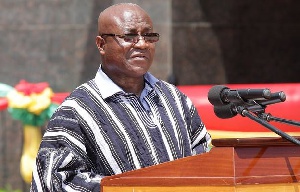 Majority Leader, Osei Kyei Mensah Bonsu
Majority Leader, Osei Kyei Mensah Bonsu
Majority Leader and Member of Parliament for Suame, Osei Kyei Mensah Bonsu says it is not the role of parliamentarians to fix roads, build health clinics, construct schools and expand other infrastructural development in their constituencies.
He said the President, Metropolitan Municipal and District Assemblies and sector ministers are the only mandated bodies to provide development across the country.
Mr. Mensah Bonsu explaining the roles of a parliamentarian at a public forum in Tamale he said parliamentarians are not agents of development and advised voters to stop judging their MPs based on number of roads they fix.
“Fellow Citizens, it is not the business of a Member of Parliament to fix the road,” the experienced lawmaker crowed out frustrated.
Under the theme; Deepening Citizen Engagement for Better Understanding of the Legislature, the forum was to educate the public on the core functions of Members of Parliament.
It was part of a literacy campaign launched by parliament front-bench to combat a growing behaviour among voters where MPs are being voted out during elections based on misconceptions about their roles and operations.
After the 2016 general elections, it was observed that many parliamentarians who had served at least two terms and gained some level of experience lost their mandate, largely due to non performance in the area of infrastructural development.
Some of them also faced stiffer competition and lost during their party internal elections. Others narrowly won and represented their parties.
It is therefore not coincidence that this particular public awareness campaign started in the Northern Region as records show many “experienced” parliamentarians in the region suffered humiliating defeat in the elections.
Notable among these losers in the region were Ibrahim Abubakari Dey, former MP for Salaga South who rose to be a ranking member of the Public Accounts Committee (PAC), Ibrahim Mutala Mohammed, former MP for Nanton, the late Abubakari Sumani, former MP for Tamale North.
Others who faced tough internal race that rattled their bank accounts are Inusah Fuseini of Tamale Central constituency, Joseph Bipoba Naabu of Yunyoo, A. B. A Fuseini of Sagnarigu who have all acquired significant experience in parliament.
The narration that dominated reasons for the revolution was the failure of these MPs to fulfil campaign promises of ensuring development and satisfying personal requests of constituents.
Leadership of parliament wants to counter this growing culture by embarking on this literacy crusade to educate voters on how parliamentarians operate.
The Majority Leader said parliamentarians have about seven functions under which they play numerous roles.
He took time to explain in detail each of the functions of a parliamentarian to the public and admonished voters to disregard candidates who will come to them with pledges to bring development to them as it is not under their remit.
He explained the representational function, deliberative function, informational function, approval function, and problem resolution function of Members of Parliament and said constituents should stop looking at their MPs as vehicle for development.
Stressing on the problem resolution function of a parliamentarian, Mr. Mensah Bonsu told the gathering constituents have misunderstood the function into individual problem resolutions where MPs are oblige to pay for marriages, funerals and school fees and other obligations of constituents.
Speakers at the forum included Haruna Iddrisu, Minority leader and MP for Tamale South, Inusah Fuseini, MP for Tamale Central, MP for Suhum ,Opare Ansah, Solomon Boar of Bunkprugu constituency and some leaders of parliament including Madam Kate Addo.
The Northern Regional minister attended the forum which was chaired by chief of Kasuli.
During the questions session, one of the dozen participants asked why MPs receive Common Fund.
The Majority leader gave an obscure answer saying MPs were to collaborate with Metropolitan Municipal and District Assemblies for efficient spending of the Common Fund.